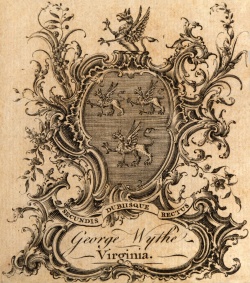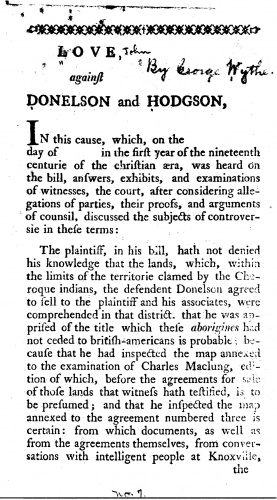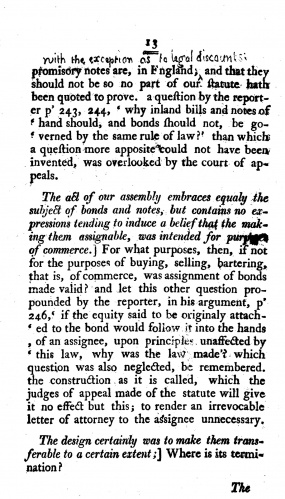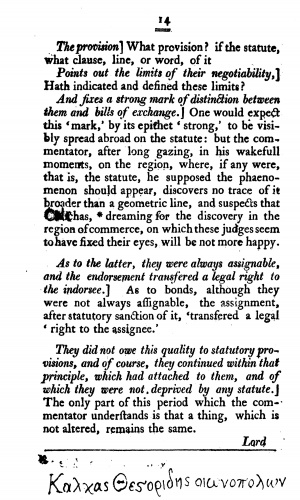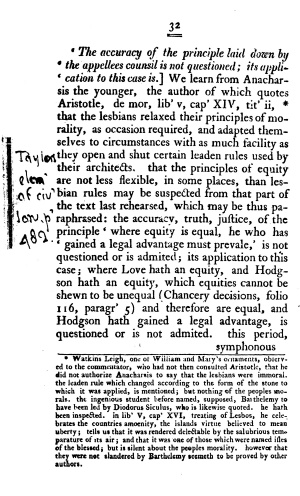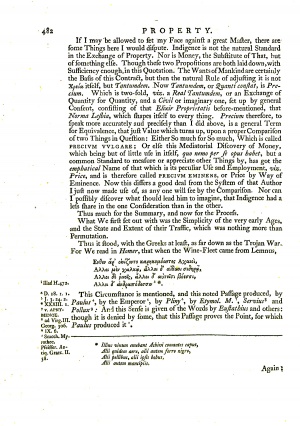Difference between revisions of "Love against Donelson"
(→Page 5) |
|||
| Line 89: | Line 89: | ||
===Page 5=== | ===Page 5=== | ||
| + | <blockquote> | ||
| + | What hath been said is undeniable, as the commentator ventureth to suppose. if the supposition be not rash, | ||
| + | |||
| + | Since the statute, which, giving validity to translation of such ''chose en action,'' and, for recovery therof, authorising assignees in their own names to prosecute actions, hath silenced the common law, Donelsons intervention in the transaction cannot affect the right of Hodgson, otherwise than that Love is entitled to the discounts mentioned before and to be defined hereafter. | ||
| + | |||
| + | ''In England, the assignee of a bond takes it charged with every species of equity which was attached to IT in the hands of the obligee.''] This is intelligible and true in case of such an obligation as this: | ||
| + | |||
| + | Know all men that i John Love am held bound unto Stockely Donelson in 40000 dollars, to be paid to him, or to his assigns, for which payment i bind my representatives, as well as myself. this obligation however shall be void if, on or before the day, &c', i pay to him 20000 dollars, the price of certain lands which he hath sold to me, covenanting that he hath a title to them, and that they are unemcumbered. | ||
| + | |||
| + | If the terms of the bond do not shew or lead to inquire for what cause the money, thereby acknowledged to be due, became due, the words<div align="right">of</div> | ||
| + | </blockquote> | ||
| + | |||
| + | ===Page 6=== | ||
| + | <blockquote> | ||
| + | of the text, 'equity attached to it in the hands of the obligee,' seem inexplicable. to attach is to take hold of something. from Stockley Donelson selling land, which was not his, to John Love, and taking an obligation for payment of the price, the deceived purchaser had a right to demand restitution of the obligation; for that, deprived of the things bought, he should retain their price, by which the evidence of the dept indicates that he was to merit them, is equity. parties would have then been ''in status quo'' they were before the bargain, or would have been after performance of it by both. of this equity, when it is expanded or inscribed on, or may be investigated from something apparent in, the instrument signifying altern obligations of the parties, may be predicated, that the equity is attached to the bond, by the words of which those obligations may be conjectured, if not discovered. the parts of the contract, for example, on the side of Stockley Donelson, that John Love shall permanently and quietly possess lands sold to him, and, on the side of John Love, that Stockley Donelson, for assurance of this benefit, shall receive an adstipulated retribution, are attached mutally, or have hold of, are connected with, each other, in whose hands soever may be the bond or writing which is evidence of the contract. | ||
| + | |||
| + | But what can be the meaning of 'equity attached' to a simple bond, obliging one to<div align="right">pay</div> | ||
| + | </blockquote> | ||
| + | |||
| + | ===Page 7=== | ||
==References== | ==References== | ||
Revision as of 10:52, 26 March 2015
by George Wythe
| Love against Donelson | ||
|
at the College of William & Mary. |
||
| Author | George Wythe | |
| Published | n.p. (Richmond, VA?): n.p. (Thomas Nicolson?) | |
| Date | n.d. (1801?) | |
| Language | English | |
| Pages | 34 | |
| Desc. | 8vo (21 cm.) | |
Love, against Donelson and Hodgson is a published opinion by George Wythe, for the case Love v. Donelson in Virginia's High Court of Chancery.[1] The report was published in pamphlet form in 1801 or later—almost certainly printed by Thomas Nicholson of Richmond, Virginia, who had published Wythe's Reports in 1795, and at least seven other supplements for Wythe, in 1796 and after.[2] Love v. Donelson was not reported in the second edition of Wythe's Reports, in 1852.[3][4]
Evidence for Inclusion in Wythe's Library
Upon his death, a copy of this pamphlet which had belonged to Wythe was bequeathed with his books to Thomas Jefferson. Jefferson had the pamphlet bound into a volume with seven of Wythe's other Chancery decisions which were published as supplements.[5] Subsequently, the volume became part of the collection at the Library of Congress, titled on the spine: Wythe's Reports. Supplement. Virginia. 1796-99 (despite this case taking place in 1801).[6] The pamphlet for Love against Donelson has a handwritten notation, "no. 7," on the first page.
Several pages of the pamphlet contain manuscript corrections by Wythe in his hand, including a footnote in Greek, apparently scraped off and corrected to 'Κάλχας Θεστορίδης οἰωνοπόλων': "Calchas, son of Thestor, far the best of augurs" (bird-diviners).[7] On another page Wythe made a notation in the margin referring to Taylor's Elements of the Civil Law (1769).[8]
Page one from Wythe's pamphlet, "Love, Against Donelson and Hodgson" (1801?). Copy at the Library of Congress.
Page 13 from Wythe's pamphlet, "Love, Against Donelson and Hodgson" (1801?). Copy at the Library of Congress.
Page 14 from Wythe's pamphlet, "Love, Against Donelson and Hodgson" (1801?), with Wythe's correction for the footnote: Κάλχας Θεστορίδης οἰωνοπόλων. Copy at the Library of Congress.
Page 32 from Wythe's pamphlet, "Love, Against Donelson and Hodgson" (1801?). Copy at the Library of Congress.
Page 482 of the third edition of John Taylor's Elements of the Civil Law (London: Charles Bathurst, 1769), with Wythe's reference to the "Norma Lesbia, which shapes itself to every thing."
Document text, 1801
Page 1
LOVE,
against
DONELSON and HODGSON,
IN this cause, which, on the day of in the first year of the nineteenth centurie of the christian æra, was heard on the bill, answers, exhibits, and examinations of witnesses, the court, after considering allegations of parties, their proofs, and arguments of counsil, discussed the subjects of controversie in these terms:
The plaintiff, in his bill, hath not denied his knowledge of that lands, which, within the limits of the territorie clamed by the Cheroque indians, the defendent Donelson agreed to fell to the plaintiff and his associates, were comprehended in that district. that apprised of the title which these aborigines had not ceded to british-americans is probable; because that he had inspected the map annexed to the examination of Charles Maclung, edition of which, before the agreements for sale of those lands that witness hath testified, is to be presumed; and that he inspected the map annexed to the agreement numbered three is certain: from which documents, as well as from the agreements themselves, from conversations with intelligent people at Knoxville,the
Page 2
the scene of the transaction, and from the public offices, the plaintiff might have derived, and is believed to have derived, all the information which the defendent could communicate.
But he (Donelson) was, by the terms of the agreements, and of covenants in the conveyances, that he would warrant generaly, sponsor as well against indians as against all other men. so that
The defendent Donelson, if for him, in his own name, judgment had been rendered in an action upon the bond which was dischargeable in the ninety sixth year of the eighteenth centurie, would have been enjoined from obtaining the whole of the money recovered, or so much of it as is equal to the price of what lands sold by him to the plaintiff were abdicated by the british americans in the treaty between them and the indians.
Against the other defendent, to whom the bond was assigned, and in whose name judgment was entered, if he had known the origin of the debt, and especialy if he had known too that the seller of the lands for the price of which the bond was given had not a title to them, like relief would have been extended: but such knowledge was denied by that defendent in his answer, which hath not been disproved.
Ought the plaintiff, then, to be relieved against the defendent Hodgson, an unconciousassignee,
Page 3
assignee, for a valuable consideration, of the bond?
In august of the eighty ninth year of the eighteenth centurie this court delivered the following opinion:
'An obligator is not intitled to relief against the obligation in the hands of the assignee, who, having paid a valuable consideration for it without knowledge of unfairness in the sale of a negro, for payment of the price whereof the obligation was granted, and who being impowered by statute to commence and prosecute an action in his own name, had a legal right to the money acknowledged by the obligation to be due, and whose equity was not less than the obligors equity.' Chancery decisions, folio 115: where objections to the opinion are answered.
In opposition to it are these words of the supreme judicatorie of this commonwealth, in the case of Norton against Rose, reported by Washington, 2 vol' p' 254: the court is of opinion, that an assignee of a bond or obligation takes the same, subject to all the equity of the obligor, conformably with which opinion a decree of the high court of chancery was reserved.
Orthodoxie of the sentence pronounced by the judges of appeal will be here examined in this commentarie; where the names of the par-ties
Page 4
ties in this case shall be put for the names of the parties in that:
Roane, j'. Upon the principles of the common law, a chose en action is not assignable, that is, the assignment does not give to the assignee a right to maintain an action in his own name.] If Love oblige himself to pay twenty thousand dollars to Donelson, or to his assignee, and Donelson assign the obligation to Hodgson for value received of him, who was neither party nor privy to the contract between the two former, and if the common law, inhibiting assignment of a chose en action, had never existed, the right of Hodgson to so much of the money as had not been paid before assignment, would have been the same as if that remainder had been, by terms of the obligation, payable immediately to himself, without pervading Donelson. for,
In the case supposed, the obligation is resolvable into this sense: I, John Love, acknowledging myself indebted twenty thousand dollars to Stockley Donelson, agree to pay them, if he order them to be paid, to William Hodgson, and the money would, after such order, that is, the assignment, have been due to tis last no less truly than it would have been due if he had been due if he had been original obligee, except that he must have discounted payments to Donelson, who would have been a mere fistula or pipe through which the obligation of Love was conveyedWhat
Page 5
What hath been said is undeniable, as the commentator ventureth to suppose. if the supposition be not rash,
Since the statute, which, giving validity to translation of such chose en action, and, for recovery therof, authorising assignees in their own names to prosecute actions, hath silenced the common law, Donelsons intervention in the transaction cannot affect the right of Hodgson, otherwise than that Love is entitled to the discounts mentioned before and to be defined hereafter.
In England, the assignee of a bond takes it charged with every species of equity which was attached to IT in the hands of the obligee.] This is intelligible and true in case of such an obligation as this:
Know all men that i John Love am held bound unto Stockely Donelson in 40000 dollars, to be paid to him, or to his assigns, for which payment i bind my representatives, as well as myself. this obligation however shall be void if, on or before the day, &c', i pay to him 20000 dollars, the price of certain lands which he hath sold to me, covenanting that he hath a title to them, and that they are unemcumbered.
If the terms of the bond do not shew or lead to inquire for what cause the money, thereby acknowledged to be due, became due, the wordsof
Page 6
of the text, 'equity attached to it in the hands of the obligee,' seem inexplicable. to attach is to take hold of something. from Stockley Donelson selling land, which was not his, to John Love, and taking an obligation for payment of the price, the deceived purchaser had a right to demand restitution of the obligation; for that, deprived of the things bought, he should retain their price, by which the evidence of the dept indicates that he was to merit them, is equity. parties would have then been in status quo they were before the bargain, or would have been after performance of it by both. of this equity, when it is expanded or inscribed on, or may be investigated from something apparent in, the instrument signifying altern obligations of the parties, may be predicated, that the equity is attached to the bond, by the words of which those obligations may be conjectured, if not discovered. the parts of the contract, for example, on the side of Stockley Donelson, that John Love shall permanently and quietly possess lands sold to him, and, on the side of John Love, that Stockley Donelson, for assurance of this benefit, shall receive an adstipulated retribution, are attached mutally, or have hold of, are connected with, each other, in whose hands soever may be the bond or writing which is evidence of the contract.
But what can be the meaning of 'equity attached' to a simple bond, obliging one topay
Page 7
References
- ↑ George Wythe, Love, against Donelson and Hodgson (Richmond, VA: Thomas Nicolson, 1801?).
- ↑ Charles Evans, in his American Bibliography, vol. 11 (1942), mistakenly gives the date of publication as 1796. Wythe states that the case took place in the "first year of the nineteenth centurie"; it is the opinion of the editors that the Chancellor would have understood that the new century began January 1, 1801, and therefore Love against Donelson must have been published sometime between 1801 and the year of Wythe's death, in 1806.
- ↑ Benjamin Blake Minor, ed., Decisions of Cases In Virginia, By the High Court Chancery, with Remarks Upon Decrees By the Court of Appeals, Reversing Some of Those Decisions, by George Wythe (Richmond, Virginia: J.W. Randolph, 1852), xli.
- ↑ Minor had access to a bound volume of pamphlets which had belonged to James Madison, and was then in the possession of William Green of Culpeper, Virginia. The Catalogue of the Choice and Extensive Law and Miscellaneous Library of the late Hon. William Green, LL.D.,... to be sold by Auction, January 18th, 1881, at Richmond, VA. (Richmond: John E. Laughton, Jr., 1881), lists the volume as follows (p. 200). Mysteriously missing from the catalogue, however, is an entry for Between Yates and Salle, specifically mentioned by Minor to have been issued as a pamphlet, presumably provided by Green (Minor, p. 163).
2325. WYTHE'S REPORTS. Aylett & Aylett, Richmond: 1796; Field & Harrison, Richmond: 1796. WYTHE (GEO.). Case upon the Statute for Distribution, Richmond: 1796. Wilkins & John Taylor, et als.; Fowler & Saunders. In one vol., 12mo. Auto. of President James Madison. Ms. notes. A rare collection of the Original Imprints, supposed by the late possessor to be unique.
- ↑ "Six tracts originally bound together in calf for Jefferson by Milligan on June 30, 1807 (cost $1.00). Rebound in Buckram for the Library of Congress." E. Millicent Sowerby, comp., Catalogue of the Library of Thomas Jefferson (Washington, D.C.: Library of Congress, 1953), 2:208.
- ↑ Library of Congress catalog record. This volume contains pamphlets for: Case upon the Statute for Distribution (1796); Field v. Harrison (1794); Fowler v. Saunders and Goodall v. Bullock (1798, together in the same pamphlet); Wilkins v. Taylor (1799); Yates v. Salle (1792); and Love v. Donelson (1801). See also: Aylett v. Aylett (1793), and Overton v. Ross (1803).
- ↑ Calchas was the prophet of Troy. Homer, Iliad 1.69.
- ↑ "Manuscript notes by Wythe." Sowerby, 2:209.
See also
- American Bibliography
- Between Fowler and Saunders
- Between Wilkins and Taylor
- Between Yates and Salle
- The Case of Overtons Mill: Prolegomena
- Case upon the Statute for Distribution (pamphlet)
- Love v. Donelson
- Report of the Case between Aylett and Aylett
- Report of the Case between Field and Harrison
External links
- Library of Congress catalog record.
- Sowerby Catalogue, at HathiTrust.
